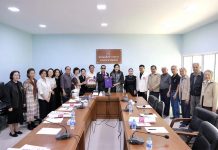
In mid-August, news of human trials using the locally produced COVID-19 vaccine provided a glimmer of optimism for the people of Thailand, who had been experiencing a vaccine supply crisis. The collaboration, dubbed ’Team Thailand,’ has worked to build a successful development of the COVID-19 vaccine. Not only do members of Team Thailand work at research institutes, but also animal testing facilities and prototype manufacturing firms adhering to GMP standards. Cooperation amongst domestic agencies in the research and development of a COVID-19 vaccine entails seeing beyond one’s organization and working together with Team Thailand to achieve vaccine stability and self-sufficiency for Thailand.
Vaccines are a determinant in resolving this pandemic problem. All countries, including Thailand, are attempting to get and distribute vaccines as soon as possible. Any country that has wide access to vaccines, will be able to resume regular life and progress. That’s why Thailand has a COVID-19 vaccine blueprint, which is a national strategy, to guarantee that everyone in Thailand has safe, appropriate, and effective access to vaccines. Three methods exist for ensuring a sufficient supply of vaccines: making advance purchases from vaccine manufacturers, expanding capacity through technological transfer, and developing home-grown vaccines.
Although all three methods must occur concurrently, the home-grown approach received little attention at first. To be completely candid, initial expectations for a local solution were dim, given Thailand’s lack of creativity and the country’s historical reliance on the purchasing system, which is simple, convenient, and provides immediate advantages. Supporting domestic COVID-19 vaccine development, on the other hand, entails establishing infrastructure and encouraging long-term research aimed at preventing future outbreaks and ensuring vaccine security. In contrast to the other two alternatives, Thailand needs more than “bargain and pay.” If the pandemic had not lasted this long, and there had been no scarcity of vaccines, no one would have considered this long-forgotten option.
What assistance may Team Thailand get from the government First, the government should facilitate connectivity among agencies. Indeed, Thailand has tremendous potential in all aspects of the value chain, upstream, midstream, and downstream, but the pieces never quite fit together. Frequently, a researcher creates something and then loses track of it. Researching on a laboratory scale is insufficient. Industry must broadly acknowledge the research. The transition from the laboratory to industry has not yet been seen. The government, via the National Vaccine Institute, has tried to connect individuals involved in research and development, facilities, and production, to facilitate the transfer from upstream to downstream. When a vaccine is ready to be released from the laboratory, it should undergo animal testing. Following animal testing, a prototype manufacturing company should match the requirements of the prototype vaccine. For instance, the manufacturing facility for mRNA vaccines is different from the manufacturing facility for viral vector vaccines.
Financial innovation is also always critical, even more so in the field of research and development. Nobody can predict if a piece of research will result in a final product or not. Financial resources, therefore, must be flexible. A government fund is subject to a plethora of rules. In the case of COVID-19, however, the country is in a race against the clock. There is no time to waste on lengthy processes. While it is normal for funders to want concrete outcomes, the government should not expect to get the completed product or vaccine immediately because of the investment. Additionally, Thailand’s basic capacity is undoubtedly limited in contrast to other countries, which means that Team Thailand has fewer resources accessible to help it. For instance, a vaccine produced in the laboratory must undergo animal testing on non-human primates, but Thailand lacks the infrastructure required for such testing. The country has just one institution dedicated to non-human primate research and safety testing, and this lack of organization causes a bottleneck in vaccine development.
Vaccine development is a challenging, complicated, high-risk, and expensive process that encompasses clinical development, process development, and assay development. The vaccine business has long recognized that vaccine development is often delayed, as shown by the worldwide vaccine industry’s success record of around 5%. Indeed, according to the New York Times, 154 vaccine candidates have been identified, with just eight vaccines approved for full use as of August 26, 2021. As the country is a relative newcomer to vaccine development. Thailand’s vaccine research is, without a doubt, slower than that of others. On the positive side, although research and development of Thai-made vaccines are not progressing at a phenomenal rate, they are much faster now than in the past. Thailand has seldom seen a scenario in which it could research, manufacture, and test a locally produced vaccine in less than a year and a half. This is, at the very least, what Team Thailand can give overall development and progress of knowledge in Thailand to manufacturers, researchers, and regulators.
Some of Team Thailand
Research and Development:
– ChulaCov19, mRNA vaccine, developed by Chulalongkorn University Centre of Excellence in Vaccine Research and Development
https://www.chula.ac.th/en/tag/mrna-vaccine/
– Baiya SARS-CoV-2 Vax 1, plant-based subunit vaccines, developed by Baiya Phytopharm Co Ltd
https://baiyaphytopharm.com/
– NDV-HXP-S, non-replicating viral vector, developed by Government Pharmaceutixal Organization and Faculty of Tropical Medicine, Mahidol University
https://www.gpo.or.th/view/397lang=en
– COVID-19 vaccine candidates developed by BIOTEC-NSTDA
http://www.nstda.or.th/en/news/news-years-2021/1420-covid-19-nasal-spray-vaccine-developed-by-nstda-getting-ready-for-human-trials.html
Facility
– National Primate Research Center of Thailand
https://nprct.org/
– Center for Animal Research, Naresuan University
– National Biopharmaceutical Facility
http://www.nbf.kmutt.ac.th/
Production
– BioNet-Asia Co., Ltd.
– Government Pharmaceutixal Organization-Merieux Biological Products
https://www2.gpo.or.th/Default.aspxtabid=150
(NNT) – Article by Silada Rojratanakiat
 |
 |
 |





